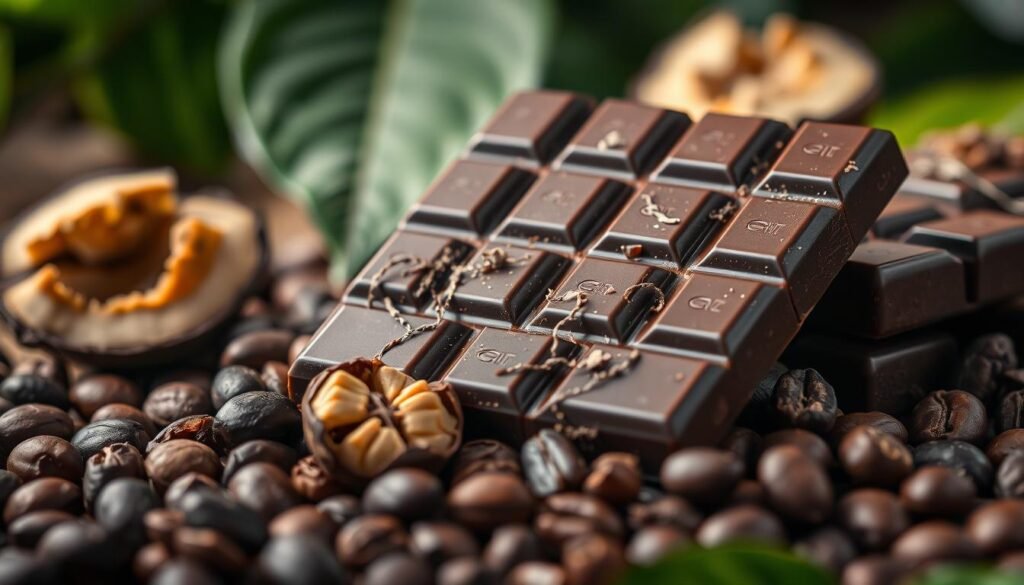Did you know over 40 million adults in the U.S. face anxiety disorders? This fact highlights the need for effective anxiety relief methods. An often-missed solution is choosing the right foods. They can be great allies in managing anxiety. They give essential nutrients that boost well-being, mood, and stress levels.
This guide covers the best foods for anxiety relief, focusing on how nutrients in common items like avocados, blueberries, and fatty fish help. By understanding the nutritional benefits and science behind these foods, you can improve your mental health. Let’s explore how diet affects anxiety management and how small meal changes can make you feel better.
Explore the best foods that may help ease anxiety
Key Takeaways
- Anxiety disorders impact over 40 million adults in the U.S.
- Foods rich in magnesium can help calm the mind.
- Fish’s Omega-3 fatty acids may reduce anxiety symptoms.
- Eating leafy greens, nuts, and probiotics promotes mental health.
- Dark chocolate’s flavonoids can enhance mood.
Understanding Anxiety and Its Impact
Anxiety is a common mental health issue around the world. It affects millions, making daily life harder for some. We will define anxiety disorders, explore their prevalence, and discuss their symptoms.
Definition of Anxiety Disorders
Anxiety disorders include various conditions marked by continuous anxiety, fear, or worry. Some of these are generalized anxiety disorder, panic disorder, and social anxiety disorder. People with these disorders might feel ongoing tension. This can hurt how they do in social settings, work, and private lives.
Prevalence of Anxiety Disorders
More than 300 million people worldwide have anxiety disorders. In the U.S., about 31.2% have experienced an anxiety disorder in their lifetime. Those affected often face a lot of psychological stress. It shows how important it is to find good ways to manage this issue.
Symptoms of Anxiety
The signs of anxiety can be physical or emotional. Here are some common symptoms:
- Tension and irritability
- Muscle tension
- Increased heart rate and palpitations
- Difficulty concentrating
- Sleep disturbances
- Excessive worry about everyday issues
Finding out if someone has anxiety is important. They may need special help. Recent studies show that nutritional psychiatry might help ease these symptoms. It could make mental health better for those affected.
Foods to Help with Anxiety
Nutritional choices are key in managing anxiety. Some foods have benefits that can help ease anxiety symptoms and boost mental health. Adding calming foods to your diet can make a big difference in how you feel.
This section looks at the nutritional benefits of various foods. It also shows how your diet can affect your mental health.
Overview of Nutritional Benefits
Eating foods rich in antioxidants and essential nutrients helps with stress. Certain nutrients are known to reduce anxiety. For instance, small red beans, blueberries, and pecans are full of antioxidants. They support brain health and might help with anxiety.
Vitamins A, C, and E are also crucial in fighting chronic illnesses. Foods rich in omega-3 fatty acids, like wild salmon and chia seeds, can lower anxiety. Meanwhile, foods with magnesium, including dark leafy greens and nuts, aid relaxation.
How Diet Affects Mental Health
Your diet plays a big role in your mental health and anxiety management. Healthy fats and whole grains provide the building blocks for brain chemicals, improving mood. Foods like avocados and almonds are great because they’re packed with B vitamins.
Zinc from cashews and beef can make you more resilient to anxiety. A balanced diet, combined with staying hydrated and making lifestyle changes, can greatly relieve anxiety.
| Food Type | Key Nutrients | Benefits for Anxiety |
|---|---|---|
| Blueberries | Antioxidants, Vitamin C | Reduce oxidative stress, improve mood |
| Salmon | Omega-3 Fatty Acids | Lower anxiety levels |
| Spinach | Magnesium, Vitamin K | Promote relaxation |
| Almonds | B Vitamins, Healthy Fats | Support brain function and mood |
| Dark Chocolate | Cocoa Flavonoids | Reduce cortisol, improve mood |
By focusing on diet for anxiety management, you can use the power of stress-relieving foods. Making simple dietary changes can greatly improve mental wellness.
Fatty Fish: A Brain-Boosting Food
Adding fatty fish to your meals can greatly improve your mind and cognitive skills. Fish like salmon and mackerel have lots of omega-3 fatty acids. These are key in helping your brain work well and in lowering stress.
Omega-3 Fatty Acids and Brain Function
Studies show omega-3 fatty acids are vital for a healthy brain. The brain is about 60% fat, and more than half of that is omega-3s. These fats boost learning, memory, and mood.
Omega-3s also help brain cells communicate better. This can slow down cognitive decline that comes with getting older.
Benefits of Consuming Salmon and Mackerel
The American Heart Association advises eating salmon and mackerel twice a week for brain health. People eating these fish feel less anxious. This shows how much diet can affect our mental state.
Omega-3 fatty acids also slow down mental decline as we age. They could even lower the risk of Alzheimer’s and other brain diseases. So, it’s smart to eat fatty fish regularly to keep your mind sharp.
Dark Chocolate: A Sweet Solution for Stress
Dark chocolate, with at least 70% cacao, is great for mood and anxiety relief. It’s packed with flavonoids, boosting brain function and happiness. Studies show it can ease depression and stress symptoms by managing cortisol, the stress hormone.
Flavonoids and Their Effects on Mood
Dark chocolate’s mood benefits come from its flavonoids. These powerful antioxidants are high on the ORAC scale, combating stress. By eating about 1.4 ounces of dark chocolate, you might feel more relaxed and less anxious.
Recommended Consumption for Anxiety Relief
Eating dark chocolate can make you feel better but remember to enjoy it in moderation. It’s rich in calories, so too much is not good. Adding it to a balanced diet, along with meditation or yoga, can enhance its calming effects. Pairing dark chocolate with positive lifestyle changes helps mental health. For extra tips on using natural remedies for anxiety, see this guide.

Turmeric: The Anti-Inflammatory Spice
Turmeric is not just a bright spice for cooking, but has health benefits too. Its main part, curcumin, is known for fighting inflammation and protecting cells. It helps the brain deal with stress, making it a good choice for anxiety relief.
Curcumin and its Role in Reducing Anxiety
Curcumin can help with many health issues, including anxiety. It might boost a brain factor linked to thinking and memory. Plus, it fights swelling and cell damage which are important in mood disorders. This compound also boosts brain chemicals and may fix anxiety-related changes.
How to Incorporate Turmeric into Your Diet
Adding turmeric to your diet is easy and good for you. You can sprinkle it on food or put it in soups and stews. Try making drinks or smoothies with it for a tasty, healthy boost. Adding black pepper can help your body use curcumin better.
- Turmeric Tea: Brew chopped or powdered turmeric root for a soothing drink.
- Curried Pumpkin Butternut Squash Creamy Vegan Soup: A recipe packed with flavor and nutrition using turmeric.
- Golden Milk: A warming beverage made with turmeric, milk (or a milk alternative), and a pinch of black pepper.
Eating more turmeric is a way to use natural anxiety remedies. It shows how foods that fight inflammation can help with anxiety. Using this spice regularly can boost not just flavor but your health too.
Chamomile: Nature’s Soothing Herb
Chamomile is well-known as a top herbal fix for anxiety. This herb is both gentle and strong, offering natural solutions for calmness. Many people love chamomile tea for its ability to ease stress and encourage relaxation.
Chamomile Tea and Its Calming Properties
Chamomile tea is a simple way to lower stress. It has antioxidants and compounds that may help our mood. It affects things like serotonin and GABA, crucial for feeling happy.
Many see chamomile as a go-to calming food. They add it to their daily routine to manage stress better.
Clinical Studies on Chamomile and Anxiety Reduction
A study took 180 people with Generalized Anxiety Disorder (GAD) and tested chamomile extract on them. For eight weeks, they took 500 to 1,500 mg daily. Good responders then went through a 26-week test, comparing chamomile extract to a dummy pill.
The goal was to see if chamomile could keep anxiety away after recovery. Sadly, under 30% of anxiety sufferers seek help. This underlines the need for natural options like chamomile. It’s even FDA approved for GAD. Thanks to its mild sedative effect, it’s a safe choice to naturally lessen anxiety.

Yogurt: The Probiotic Powerhouse
Yogurt is a top source of probiotics, which are good bacteria. These bacteria aid in digestive and mental health. The gut and brain connection is important. Eating probiotic foods like yogurt can make you feel better mentally, helping reduce anxiety.
Gut-Brain Axis and Mental Health
Studies show our gut health greatly affects our mental state. Yogurt has probiotics like Lactobacillus and Bifidobacterium. These can mend nerve damage and boost brain health. Consuming probiotic-rich yogurt daily may lower anxiety. This highlights how crucial a balanced microbiome is for our mood.
Choosing the Right Yogurt for Benefits
Choosing the right yogurt is key for probiotic gains. Go for plain Greek yogurt or those marked with live cultures. Greek yogurt has more good bacteria because of its making process. Still, sugar in flavored yogurts weakens probiotics. Look for yogurts with specific probiotic strain names for extra benefits.
Green Tea: The Relaxing Beverage
Green tea is a popular choice for relaxation, thanks to L-theanine. This amino acid helps calm your mind. It makes green tea great for mental health.
L-Theanine and Its Calming Effects
L-theanine helps you relax without feeling sleepy. It increases alpha brain waves, keeping you calm but alert. Drinking green tea may help you feel less stressed.
Taking 200 to 400 milligrams of L-theanine can ease anxiety signs. So, green tea is good for your mind.
How Green Tea Can Benefit Mental Health
Green tea boosts mental health in several ways. It gives a mild caffeine boost for focus and calm. People drinking it often may feel less anxious.
This drink aids in stress management and emotional health. So, it’s good for you in many ways.

Additional Anxiety-Reducing Foods to Consider
To handle anxiety, it’s smart to try different foods that help your brain and mood. Eating a mix of foods is key. They can bring a lot of good, especially those full of brain-boosting nutrients. Picking the right foods to fight anxiety matters a lot.
Other Nutritional Foods for Anxiety Management
Many foods have the power to lower anxiety. Adding them to your meals can make you feel mentally better:
- Eggs: A great source of vitamin D and tryptophan, essential for serotonin production.
- Pumpkin seeds: Rich in potassium and zinc, these seeds may help reduce stress.
- Blueberries: Known for their antioxidant properties, they are linked to fewer symptoms of depression.
- Almonds: These nuts have been associated with decreased depressive symptoms.
- Brazil nuts: High in selenium, these can improve mood by reducing inflammation.
Including a Variety of Foods in Your Diet
It’s important to eat many kinds of foods to fight anxiety. Aim for whole foods, veggies, and fruits. Below, you’ll find a table of foods that calm anxiety, with their key nutrients:
| Food | Key Nutrients | Benefits |
|---|---|---|
| Eggs | Vitamin D, Tryptophan | Aids serotonin production |
| Pumpkin Seeds | Potassium, Zinc | Reduces stress and mood disorders |
| Blueberries | Antioxidants | Decreases symptoms of depression |
| Almonds | Vitamin E | Improves mood |
| Brazil Nuts | Selenium | Reduces inflammation and supports mood |
Choosing foods that reduce anxiety can have a big impact on your mental health. Bringing a variety of foods into your daily eating promotes a well-rounded approach. This helps fight anxiety and boosts overall happiness.
Conclusion
Adding foods to help with anxiety to your diet is a smart move. Fatty fish, dark chocolate, and yogurt filled with probiotics not only boost health but also fight anxiety. Knowing which foods to avoid, like those high in sugar and caffeine, is key for anyone wanting to eat against anxiety.
Eating foods rich in vitamins, minerals, and essential fats helps your brain and mood. Including foods with magnesium, antioxidants, and omega-3s in your meals is important. Moving to an anti-anxiety diet helps with symptoms and improves your food relationship, playing a big role in managing mental health.
To improve mental well-being, mix in many nutrient-rich foods and cut out those that make anxiety worse. Everyone is urged to try these healthy options in their diets. This not only makes the body healthier but also calms the mind.